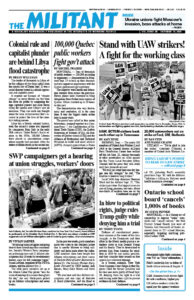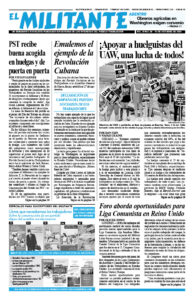MONTREAL — In a blatant act of censorship to impose “woke” standards and “cancel culture,” the Peel District School Board, just west of Toronto, had thousands of books removed from its 257 school libraries, especially targeting anything published before 2008.
They were acting in response to a directive from the Ontario Minister of Education to implement an “equity-based book-weeding process.” The books removed include The Diary of a Young Girl by Anne Frank and the entire Harry Potter series by J.K. Rowling.
Many of the books were dumped in landfills to ensure that they cannot be used by anyone else, the school board stated, because they are “inherently racist, classist, heteronormative and/or sexist” and therefore “perpetuate harm and oppression.” This includes many books that are considered classics, since they “typically consist of Euro-centric texts” that reinforce “colonial ideologies” and are “not inclusive, culturally responsive, relevant or accurate.”
“No society that destroys books has ever ended up on the right side of history!” warned Libraries not Landfills, a group of parent, grandparents and other community members formed to fight the book banning.
A photo of half-empty bookshelves taken at the start of the new school year by outraged grade 10 student Reina Takata has been widely reproduced in news articles on the purge. Takata estimates that more than 50% of her school’s library books are gone.
“Authors who wrote about Japanese internment camps are going to be erased and the entire events that went on historically for Japanese Canadians are going to be removed,” said Takata, who is of Japanese descent. “That worries me a lot.”
In the wake of public outrage, Ontario Education Minister Stephen Lecce told the Toronto Sun that the Peel School Board had misinterpreted the ministry directive and that it is “offensive” to remove books from years past “that educate students on Canada’s history, antisemitism or celebrated literary classics.” He instructed them to put a hold on the culling.
Toronto board cancels Shakespeare
But this is not the first time a school district has implemented the liberal “cancel culture” line of the Ministry of Education. In February the Toronto District School Board voted 18-3 to cancel the Grade 11 English course, which focuses on Shakespeare, Charles Dickens and other classics. It replaced the course with one centered on the works of Canadian Indigenous writers. Other Ontario school boards have taken similar action.
Puncturing school board claims that the measures “are responsive to student interest and engagement,” student Daniel Manandhar wrote an opinion piece in the National Post protesting the change. Education about Indigenous history and concerns “is important, but this new curriculum will diminish students’ education in English classics,” he said. “It is precisely because the classics hold substance that they sometimes offend: they stand for something.”
In 2019 the Providence Catholic School Board in southwestern Ontario removed more than 4,700 books from 30 school libraries, saying they had “outdated content and carried negative stereotypes about First Nations, Métis and Inuit people” or reflected “cultural appropriation.” Thirty books were burned in a “flame purification” ritual and the ashes of “racism, discrimination and stereotypes” used as fertilizer to plant a tree. The event was called, “Giving Back to Mother Earth.”
Similar campaigns are underway in the U.S. and elsewhere.
“Schools and universities have become seedbeds of censorship where young people are supposed to be guaranteed ‘safe spaces’ and ‘protected’ from words, ideas, facts or artistic works deemed by the wise to be literally ‘hurtful’ or ‘offensive’ to the youth,” noted Mary-Alice Waters, a leader of the Socialist Workers Party in the U.S. in Labor, Nature, and the Evolution of Humanity: The Long View of History, published by Pathfinder Press. “Students are being taught that great works of art, literature, and scientific conquests of past generations, from which we learn and which we transform as we build on today, are at best irrelevant, if not products of ‘white supremacy,’ ‘toxic masculinity,’ ‘transphobia,’ and ‘misogyny.’”
Instead, what is needed is to be “challenged to expand historical and cultural horizons,” she says, “to always be ‘broadening your scope,’ as Malcolm X urged workers and youth.”

